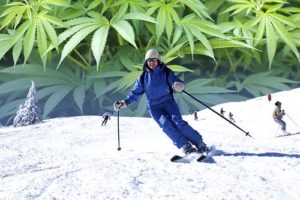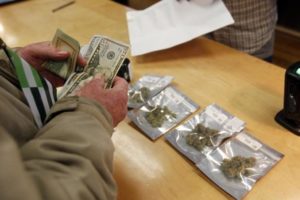Nothing has changed. Smoking marijuana remains illegal at Lake Tahoe ski resorts.
Despite the new law going into effect on Jan. 1, it remains illegal to smoke marijuana at any public place throughout California and Nevada.
“It is not legal to partake in public. And we’re pretty public,” stated Mt. Rose ski resort spokesperson Mike Pierce.

Public places at ski resorts include trails, off-piste areas, chairlifts, gondolas, lift lines, and cars located in parking lots.
“The new law will not change the Squaw Valley Alpine Meadows Courtesy Code, which prohibits smoking other than in designated smoking areas,” said resort spokesperson Liesl Hepburn. “Designated smoking areas are provided for the use of tobacco products only.”
The use of marijuana is clearly defined in the Squaw Valley Alpine Meadows courtesy code.
Dealing with skiers and snowboarders who want to smoke weed at a ski resort is not a new problem – it’s one that’s been dealt with for decades. Consuming drugs or alcohol has always been something ski resorts won’t tolerate…
“Marijuana impairs your senses. Skiing, snowboarding, and other recreational activities at ski resorts are athletic activities that require dexterity, skill, and awareness,” said Sierra-at-Tahoe spokesperson Thea Hardy. “Participating in these activities while impaired is neither safe for you nor those enjoying the activities with you.”
Most Lake Tahoe ski resorts require skiers and riders to sign liability documents due to the dangerous nature of the sport. Ski resort employees are instructed to look for the distinct signs that someone is under the influence of weed, alcohol or any drug.
“Being a family-friendly resort, we discourage smoking of any kind,” said Diamond Peak spokesperson Jaclyn Ream. “Although recreational marijuana may be legal in California and Nevada, it’s still illegal to smoke it in public. For the safety of the public, law enforcement would be called for anyone breaking the law on our property.”
Additionally, most U.S. ski resorts are at least partially located on federal land. Marijuana is still illegal at the federal level, making smoking on the slopes doubly illegal.
Anyone seen or suspected of smoking pot at a ski resort can expect consequences. Many resorts have a police presence on site. Squaw Valley Alpine Meadows says it has Placer County Sheriff’s and California Highway Patrol offices on site, ready to enforce state law.
“In short, do not possess or use marijuana illegally at any California or Nevada ski resorts or you will be subject to ejection, arrest, and/or prosecution,” Hardy said.
South Lake Tahoe and Truckee have created moratoriums on recreational marijuana businesses. That means weed won’t be available until late spring – at the earliest.
Even though some towns won’t be selling recreational pot, people visiting Truckee or South Lake Tahoe don’t have to go far to purchase weed. They can buy and consume pot legally in nearby Nevada.

One dispensary in Incline Village near the Nevada side of Lake Tahoe currently offers recreational marijuana. There are also roughly a dozen dispensaries offering marijuana in the Reno-Sparks area, located approximately 30 to 45 minutes from Lake Tahoe.
Tahoe resorts aren’t expecting an influx of new visitors due to the change in California marijuana laws. Ski area states like Colorado, Washington and Oregon already legalized pot.
Vail Resorts, which has three ski resorts in Lake Tahoe – Kirkwood Mountain, Northstar California and Heavenly Mountain – has already established its marijuana policy at its Colorado resorts.
“Vail Resorts takes a zero tolerance position toward skiing or riding under the influence of alcohol and drugs” said Kevin Cooper, a Tahoe spokesperson for Vail Resorts. “Further, we do not permit the consumption of any drug, including marijuana, in or on any of our lifts, facilities or premises that are under our control, on or off mountain.”